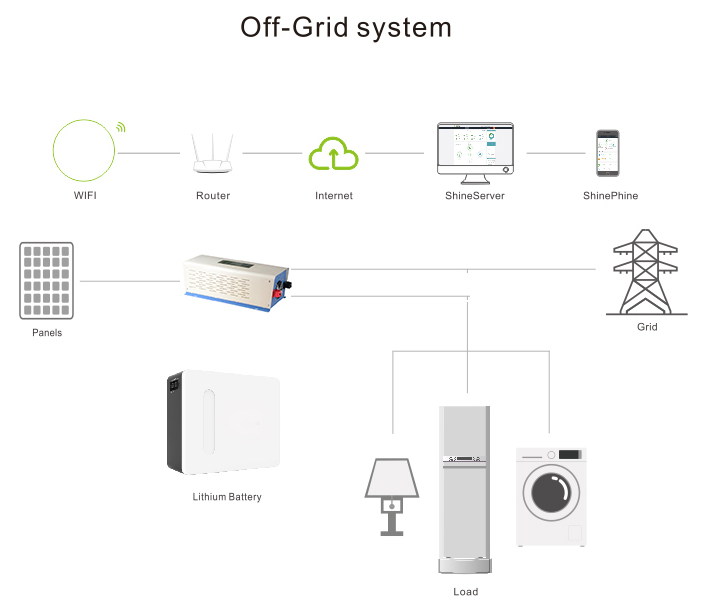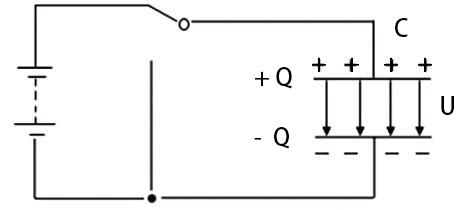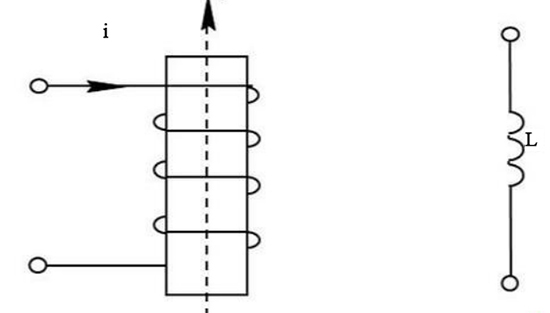In the solar PV grid system, the solar module, inverter and power grid can constitute the electrical system. The component will convert the solar energy based on the solar radiation and then the inverter will output related power. Thus, an on-grid inverter does not have special demand on the AC overload because basically, the inverter output power will not exceed component power. In the solar PV off-grid system, components, batteries, inverter and load constitute the electrical system. The output power of the inverter is decided by the load. The start power of the motor of some inductive-load devices like air conditioners or water pumps is 3-5 times the rated power. Thus, the off-grid inverter has special requirements for overload situations.

The peak power of the off-grid inverter that adopts high-frequency insulation technology can be 2 times the rated power. The peak power of the off-grid inverter that adopts power-frequency isolation technology can be 3 times the rated power. A set of 3kW high-frequency off-grid inverters can drive a set of 1P air conditioners (The start power is about 5.5kVA). A 12kW power-frequency off-grid inverter can drive a set of 6P air conditioners (The start power is about 33kVA). Some energy provided by the inverter to drive the load is from the battery or solar PV module. If it is not enough, the excess part is from the energy storage elements (capacitors and inductors) of the inverter.
Analysis of the Off-Grid Inverter Overload Capacity from Circuit
Capacitors and inductors are both energy storage components. The difference is that the capacitor stores power energy in an electric field form. The larger the capacitor capacity is, the larger the stored power will be. The inductor stores power energy in a magnetic field form. The larger the permeability of the inductor core is, the larger the inductance and the stored power energy will be.
The working principle of the capacitor can be discovered from its structure. As shown in the following diagram, the two sides are separately equipped with a mental plate to lead out two electrodes. At the same time, the middle place is isolated by the insulation material. In the absence of an applied electric field at the 2 capacitor terminals, the positive and negative charges on the two electrode plates are in equilibrium.

As shown in the above photo, it can be found that when an external electric field is added to the 2 capacitor terminals, the positive charges are accumulated on one electrode plate and the negative charges are accumulated on the other electrode plate. When the voltage at the 2 capacitor terminals continuously increases and reaches the power voltage, the capacitor will stop charging. Under this situation, the capacitor energy will not disappear even if the external circuit connection is cut off. This is affected by the rule that electric charges repel and unlike ones attract. The charges at two terminals attract each other to store the energy.
Power-frequency isolation transformer refers to a transformer with a 50Hz frequency. Primary and secondary transformers all have inductors that can store certain power energy, just like the filter inductors of the off-grid inverter. When the inductor passes through the current, the current has a magnetic field. When the current magnetic field passes by the magnetic core, the current magnetic field will break the balance status of the magnetic domain and drive the magnetic domain to the external magnetic field direction. Thus, the magnetic core will create an external magnetic field. The external magnetic field generation process is actually the process of how the magnetic field is stored by the inductor.
The inductor is a component made of enameled wire and it is added to the insulating framework or magnetic core. When the current passes the coil, the magnetic field will be generated around it. When the passed current contains AC, the generated magnetic field will change frequently. In accordance with the electromagnetic induction principles, the changing magnetic line will generate induction electromotive force at two coil terminals. However, the direction of this induction electromotive force is opposite to the direction of the original induction electromotive force, which can prevent the current change.

It can be concluded that the inductor is mainly used to prevent the current change. When the current increases, it will hinder the current increase and will store some energy through the magnetic field. When the current decreases, it will hinder the decrease of the current in the circuit and will release some stored power to maintain the current. Due to its energy storage characteristics, the inductor can realize the filter and delay functions.
In a solar PV off-grid system, the output power is determined by the load. When a motor or other devices with inductive load are started, a large current will be required within a short time. The PV system and battery are not able to provide this energy. In addition, if the lithium battery outputs excessively in a short time, it may be explored. However, the capacitor, inductor, and transformer of the off-grid inverter can store power and will not be damaged even if it amplifies the output several times in a short time. Therefore, off-grid inverters can be overloaded several times.
There are two kinds of solar off-grid inverters in Inverter Online Shop, one is a multifunctional inverter/charger, from 700W to 6000W, DC12V/24V/48V input, 120V/220V/230V AC output, combined with inverter and battery charger function. Another version is a 3-phase with power from 8kW to 200kW.
